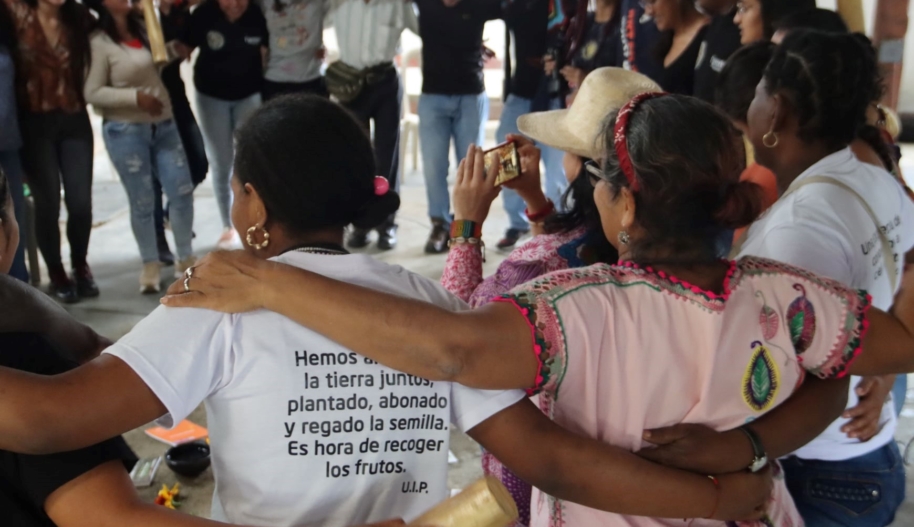Recently, Amnesty Canada organized a meeting to enable four threatened women human rights defenders in Colombia to share their experiences with Canada’s Ambassador for Women, Peace and Security, Jacqueline O’Neill.
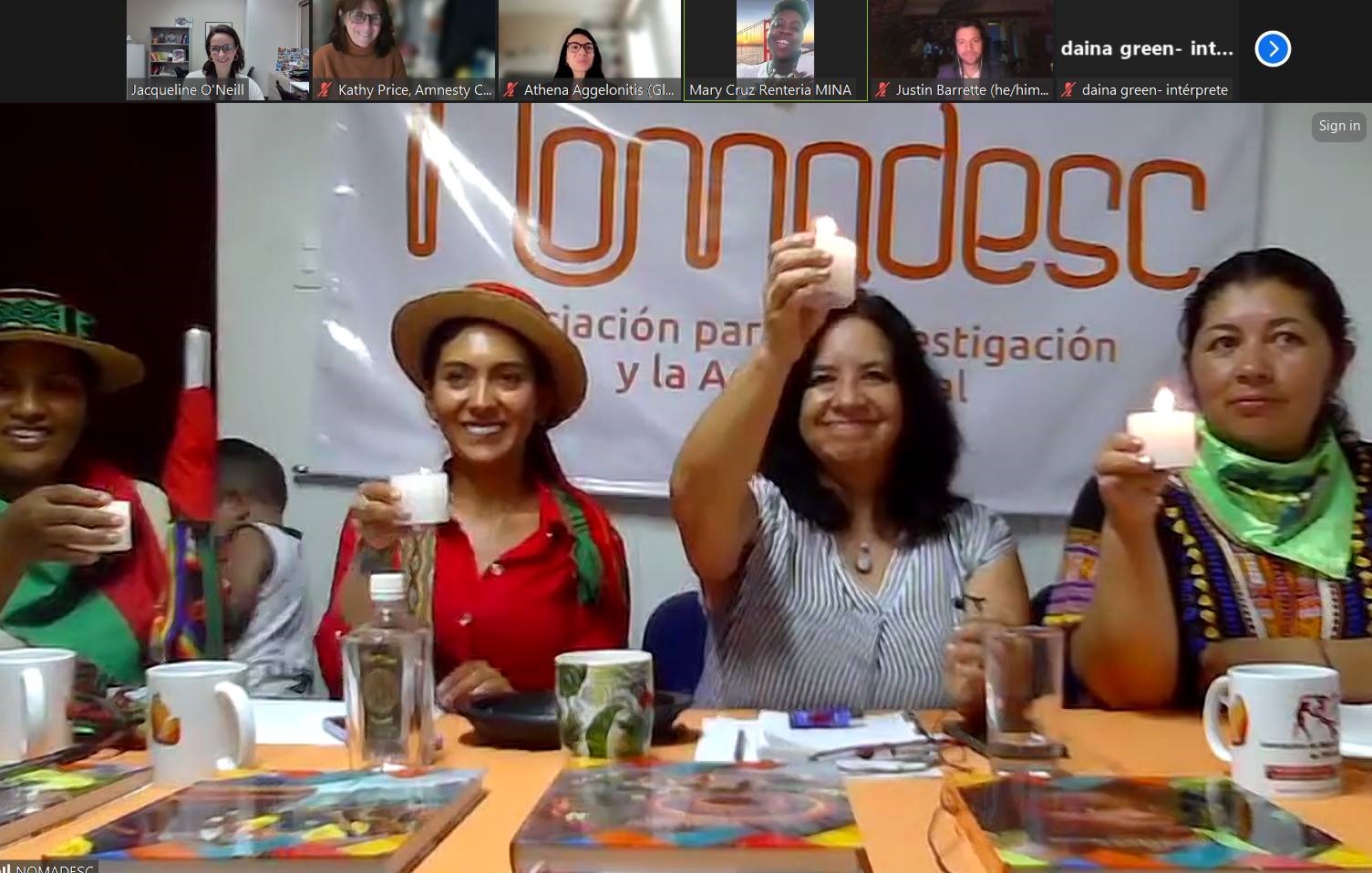
This is what the women defenders shared about the realities they are experiencing.
Berenice Celeita, Association for Research and Social Action (NOMADESC)
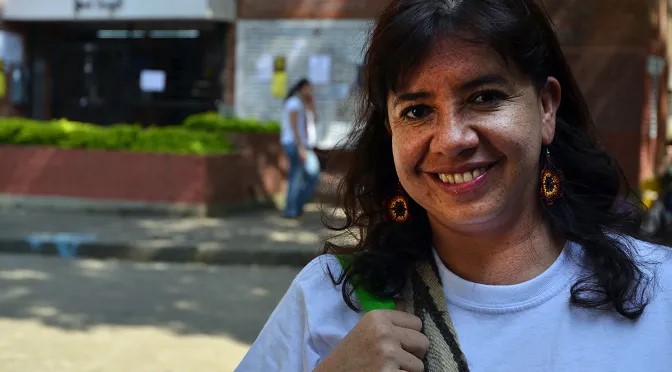
When my organization was founded, our priority was defending the territorial rights of Afro-Colombian communities and Indigenous peoples facing enormous, historic inequality and suffering disproportionate impacts of the armed conflict. This is the reality of women too. We need increased participation by women in decision-making spaces. We need the voices of women to be heard and taken into account.
One of the biggest challenges we face is impunity. It is like a disease in Colombia. This has enabled the persecution of women. For decades, women have suffered forced displacement, uprooting, dispossession. Women have been the victims of atrocious crimes, including sexual violence and abuse at the hands of illegal armed actors and state security forces.
Here in Cali, during protests that were part of a National Strike in 2021, the police committed more than 250 acts of sexual abuse against women and girls who were simply exercising their right to participation.
What happened must be made known and the perpetrators of these heinous crimes against women must be brought to justice, so this does not happen again.
As a result of our work to make visible gender-based violence by security forces in 2021 and to take legal action against those responsible, we received threats sent to our cell phones demanding that we stop what we were doing because we were on a list of people who were going to be killed.
They infiltrated our phones. They also flew a drone inside our office, and used a device provided to a private security guard by the police to monitor our activities.
As a result of our work to make visible gender-based violence by security forces in 2021 and to take legal action against those responsible, we received threats sent to our cell phones demanding that we stop what we were doing because we were on a list of people who were going to be killed.
Berenice Celeita, NOMADESC
Protection is a fundamental issue for all of us women human rights defenders. Exercising our authority and true to our cosmovisions as Afro, Indigenous, and campesina (rural farmer) women in the territories, we have developed important routes to collective self-defense that the state still does not understand.
As women human rights defenders, we do not want to count more deaths. We have buried too many. We would rather use our potential to sow life, to ensure food sovereignty, to plant joy in our territories – rather than day after day, attending to one emergency after another.
We believe that a focus on women, peace, and security can help us to materialize many of the proposals that we have been advancing, along with our protection protocols.
Deyanira Soscue, Governor of Cerro Tijeras Indigenous Reserve
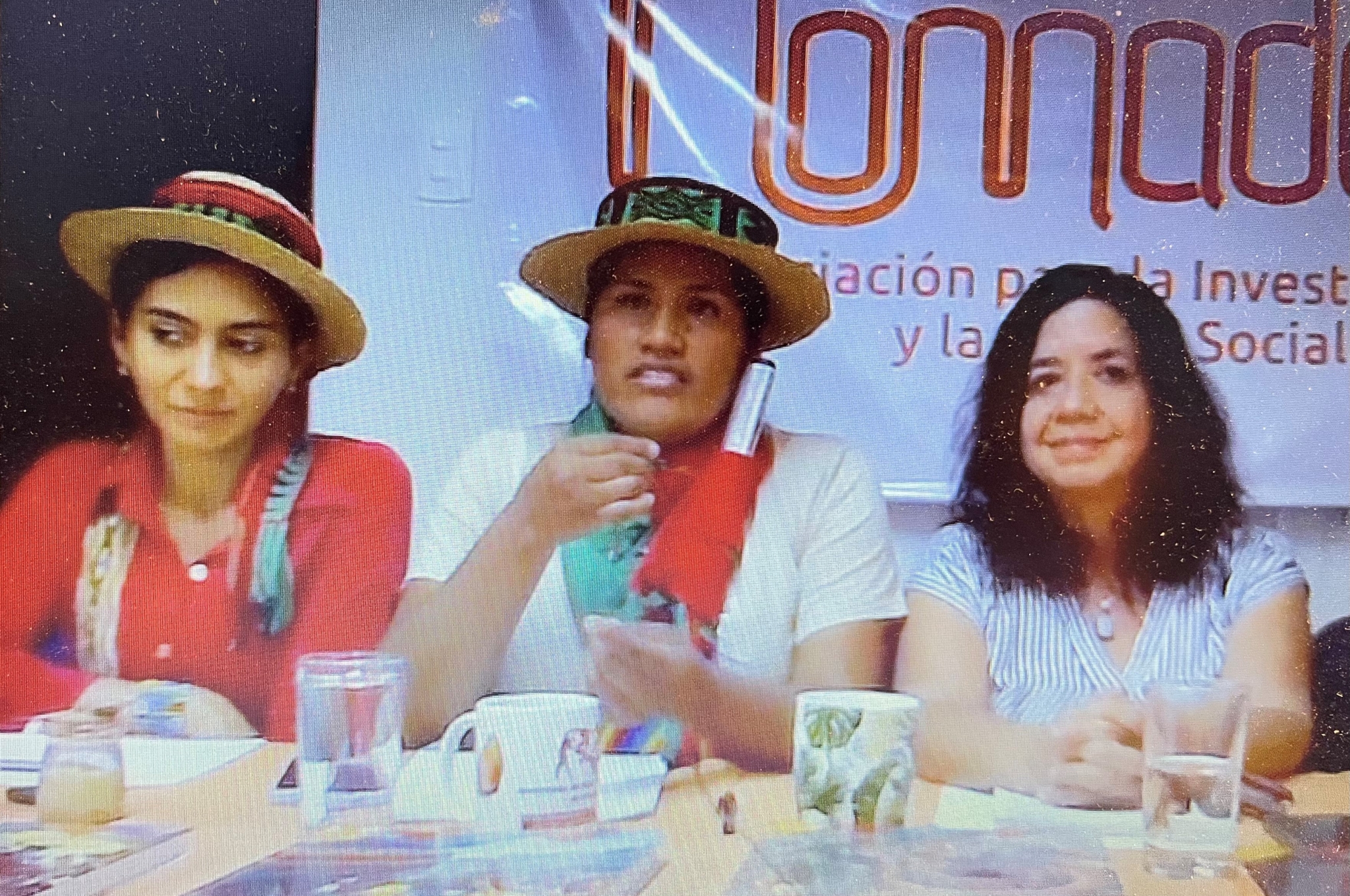
For 20 years I have been working to defend Indigenous territory. It is extremely hard, as a woman leader, as this exposes us to high risks.
When the peace agreement was signed (in 2016), it was a moment of hope. We had so many dreams for our territories – that there would be harmony, equality, and we would be able to live in peace and tranquility. But today, the reality is ongoing military dispute waged by illegal armed groups and legal armed groups, like the army, with the aim of territorial control. With this comes physical and cultural extermination for Indigenous peoples. A week ago, they assassinated a spiritual guide within our cosmovision and culture as Nasa people. Death has been normalized.
We face accusations from rebel groups that because we are leaders in our territory, we must be collaborating with the State. But if we leave our territory for any reason, we are accused by others of collaborating with guerrilla forces. We are caught between a rock and a hard place. No matter how much we want to defend our lives and our communities, they continue to exterminate us.
I was told that if I return to my territory, they will kill me or my son … We need guarantees to continue surviving, to continue defending our territory as Indigenous authorities ...
Deyanira Soscue, Governor of Cerro Tijeras Indigenous Reserve
The armed groups force our children to join them. I’m talking about girls and boys as young as 8 years old who are forced to take part in armed combat. If the children refuse to obey, they are subjected to “war courts” and killed, ending up in mass graves.
Outside of Colombia, you may hear good things about how there is now peace here. But in our Indigenous communities, the reality is very different. Leaders are killed to increase the fear within our communities and take control of our territory for economic gain.
Last Thursday, I received a direct death threat from a member of an armed group. Now I cannot return to my territory. I have a 2-year-old child. I was told that if I return to my territory, they will kill me or my son.
What are we asking for? We need guarantees to continue surviving, to continue defending our territory as Indigenous authorities, to continue exercising our right to self-governance in our territory.
It helps us when the violence and threats that we are experiencing are made visible in international spaces. We need international support as we defend our rights, our territory, our authority and our lives.
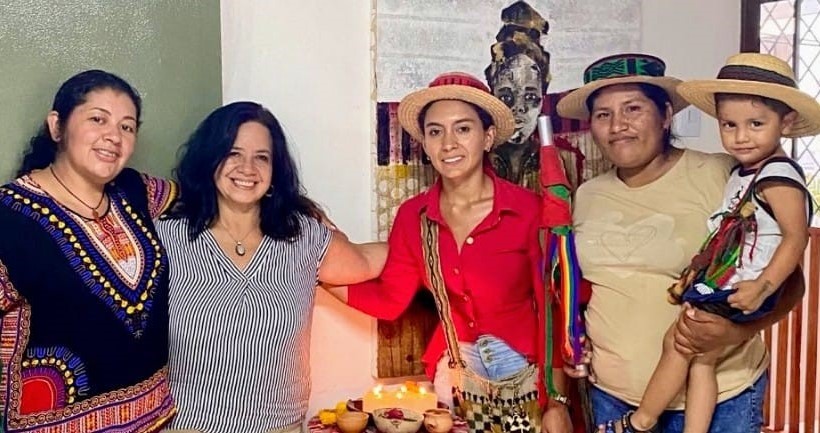
Luz Enith Valencia, Director of the Agua Clara Education Centre, Cerro Tijeras Indigenous Reserve
We continue to walk a path of struggle and resistance, as our elders and ancestral grandparents taught us. It is a long journey of our organizations, CRIC and ACIN, to vindicate our rights, through resistance activities such as the Minga.
In Indigenous territories and rural areas, most of our students walk for hours to reach their schools, through mountainous and isolated areas. Unfortunately, during that journey many of our children, but mainly our girls, have been victims of sexual abuse by armed actors and sadly they have also been caught in the middle of armed confrontations. In our territory, it is more viable for families to protect their children’s wellbeing than send them to school.
We hear about the peace processes that are happening, but in Indigenous territories we have never felt that peace.
As women defenders, sometimes we can’t even see our parents anymore because of the risk to them. A tactic to try to silence us is to go after our families. We hold up the memory of all the women who have given their lives because in Colombia there have been many women who were murdered while trying to transform unjust realities.
As women defenders, sometimes we can’t even see our parents anymore because of the risk to them. A tactic to try to silence us is to go after our families. We hold up the memory of all the women who have given their lives because in Colombia there have been many women who were murdered while trying to transform unjust realities.
Luz Enith Valencia, Director of the Agua Clara Education Centre
At our centre, we prioritize education that recovers our ancestral customs and women’s leadership. Students we have trained are beginning to get jobs at the mayor’s office. It fills us with hope. We are no longer just four or five women. We are increasing the number of people with clarity and identity, who are willing to fight for our rights.
We have been carrying out this process for four years now, in our own way, autonomously, with all sorts of difficulties and with all the armed actors against us. We are resisting the destructive impacts of mining and hydroelectric multinationals, a multinational that harvests trees, and also illegal economies, another huge monster that is very difficult to counteract. Our political initiatives go hand in hand with the community-based economic enterprises that we are creating. These are not multinationals, but entrepreneurial projects that guarantee our families a dignified diet, with quality and diverse foods, not monocrops.
Thanks to the efforts of our authorities and the community, we are advancing. Our struggle continues. We will continue so that education is not a privilege for just a few because we understand the huge potential that exists in our territories.
Yudy Campo, President of the Women’s Network of the Campesino Movement of Cajibio
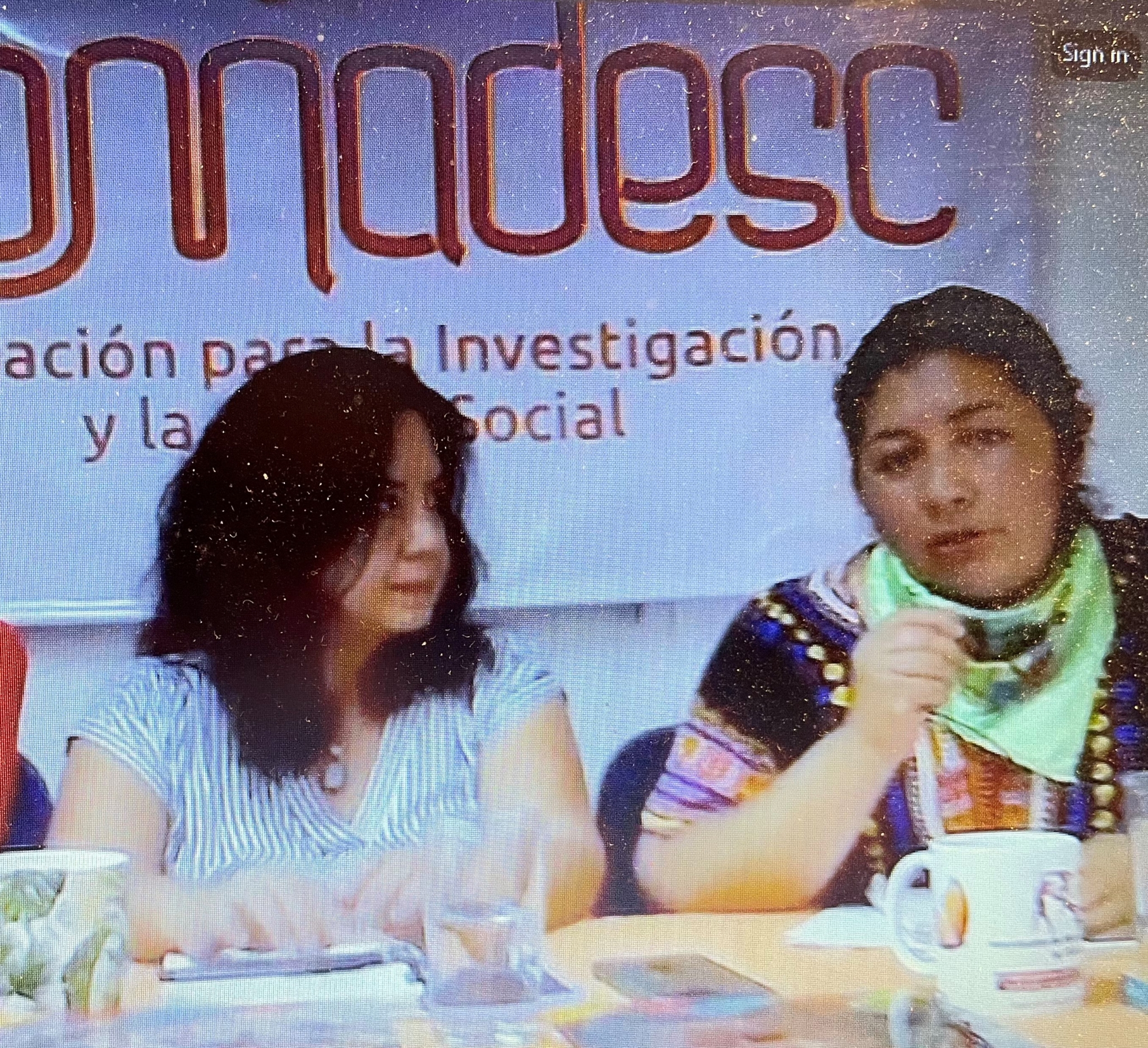
Since 2016, we have been organizing collectively in our territory to defend the rights and lives of rural women. We are determined to live free of violence. Yet we are unable to escape violence caused by the presence of armed groups, illicit crops, and multinationals that have control of land in our territory.
Our struggle is aimed at achieving equal rights. This means we must defend our territorial rights. We are also fighting for food sovereignty, for our own economy, for women’s empowerment, for economic autonomy and an end to dependence, which is another reason why women suffer so much violence.
Food sovereignty not only requires access to land, but also to guarantees of protection for water and the environment. We have declared ourselves to be defenders of life in all its dimensions, nature, the life of planet Earth and the life of human beings.
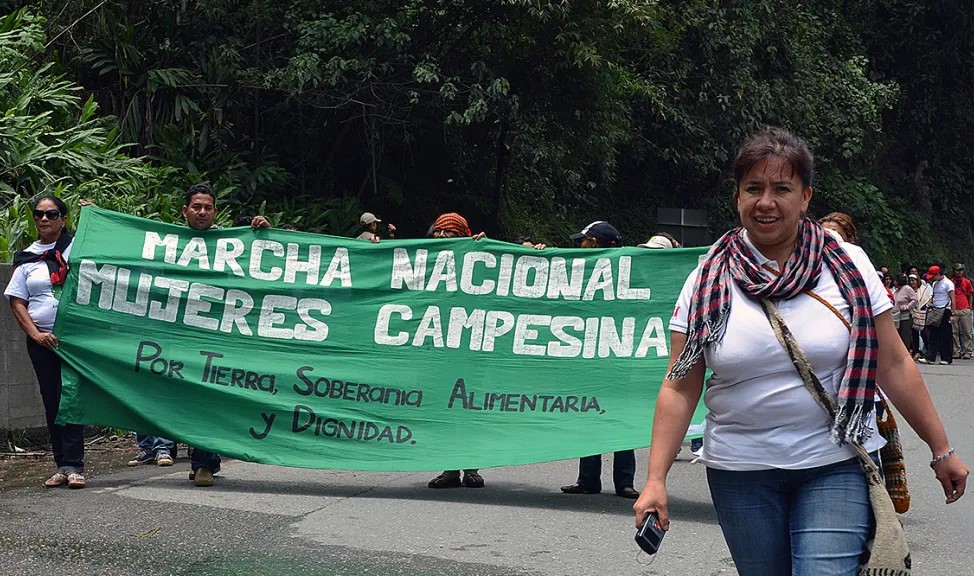
We are committed to peacebuilding. But it is not easy because peace in our territories is far from a reality today. Young people who want to live in the countryside have had to leave with their families because there is a latent risk that they could be taken and forced into illegal armed groups or be killed. As women, we agonize over what to do. We have families and we are always worrying: if we are forced to uproot and leave, what will happen to our families – but if we stay, what will happen? We are unable to carry out the work of our Women’s Network to promote political participation by women, because we are singled out. Armed actors prohibit us from free movement to do our work. We want our rights to be guaranteed, including women’s political participation, freedom to express ourselves and to implement our ‘Plans for Life’.
We need land to grow food, using organic farming, caring for life. Seeking such things has resulted in repeated threats, forcing leaders to leave. We urgently need guarantees for community organizing without violent reprisals, and for women’s organization in our region. We need your support.
Yudy Campo, Women’s Network of the Campesino Movement of Cajibio
We are promoting the peasant guard, the women’s guard. We have an essential role, but it is a constant struggle to achieve recognition by government officials, to be heard and prioritized.
We are also concerned about a multinational paper company in our territory. It operates with 4,000 hectares of land, while we women have one or two hectares, or even just half a hectare of land to survive. The company is responsible for contamination of the environment and deterioration of the soil. Those of us who have opposed the company and denounced its conduct have been persecuted and threatened. This is a community struggle for equality, for the right to reclaim land for just redistribution, for agrarian reform, and land use planning with the participation of communities.
We need land to grow food, using organic farming, caring for life. Seeking such things has resulted in repeated threats, forcing leaders to leave. We urgently need guarantees for community organizing without violent reprisals, and for women’s organization in our region. We need your support. We need the challenges we are facing and our struggles to be made visible.
Mary Cruz Rentería, Coordinator of Black Women of Palenque el Congal of Buenaventura
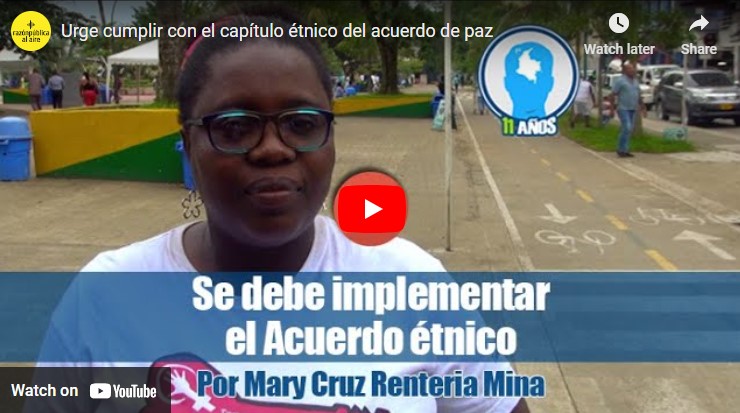
Territory is very important to us. But our territory is being impacted by armed conflict, violence and discrimination.
It is important to say that the number of victims of gender-based violence increases every day. Armed conflict exacerbates the violence against us, with sexual violence, threats, intimidation, dispossession and displacement of women.
Despite the signing of the peace agreement in 2016, there are still crimes against humanity committed against Black, Indigenous and campesina women in Colombia. They make us disappear or kill us and dismember our bodies. Where I am is territory with a port that connects Colombia with the world and there are corridors for the trafficking of women and girls. Mega projects are implemented here in Buenaventura and in other parts of the Pacific that disproportionately affect women.
Women have been playing a very important role in the defense of human rights. All defenders are at risk in Colombia, but women defenders face additional risks. Double discrimination means the risks are exacerbated even more for women defenders in Indigenous and Black territories, as well as campesina women. All of us in this meeting have suffered not just one, two, or three threats or attacks due to our work. We denounce them but there are no results, there is no justice. There is no response from the authorities.
All of us in this meeting have suffered not just one, two, or three threats or attacks due to our work. We denounce them but there are no results, there is no justice … Today our greatest protection strategy, after the ancestral knowledge that we have inherited, has to do with you all watching.
Mary Cruz Rentería, Coordinator of Black Women of Palenque el Congal
Urgent action must be taken to save lives and safeguard the integrity of the territories where women live. First, the proposals that we have built from our cosmovision of self-protection and collective protection must be implemented. These proposals go beyond two bodyguards in an armored car, a bulletproof vest, and other measures that may be offered to threatened defenders by the National Protection program. The program may provide a cellphone to call for help. But where we live, there is no signal. Or they provide a panic button and it doesn’t work.
What do we need? In 2019, the Constitutional Court issued Order 092 with guidelines for actions to protect women in Colombia. It needs to be implemented. For us, it is also very important to strengthen alliances that generate international attention and support. Many of us are alive today because we have these alliances, these tangled networks among ourselves and with international organizations, but also with some states through their embassies and diplomats. It is one thing for me to talk about what is happening. It carries weight when others like the Ambassador raise these issues, draw attention to them and call for action. Today our greatest protection strategy, after the ancestral knowledge that we have inherited, has to do with you all watching. You need to continue visiting the territory to see the other side of what is happening.
Finally, we need people in international spaces to advocate for full implementation of the Ethnic Chapter of the 2016 Peace Accords. This is an important safeguard. Implementation is urgent because violations of ethnic rights are taking place again.
Take Action
E-action
Support the call by women human rights defenders in Colombia for an overhaul of the police to prevent more gender-based violence. Sign our Colombia: Protect Peaceful Protest, Reform Repressive Police E-Action.
Join calls on Colombia for coordinated action with women human rights defenders, amid a new wave of dangerous threats. Sign our Keep Hope Alive in Colombia E-Action.
Be a multiplier by sharing these action and inviting others to sign them.
Social Media
Amplify this post by Canada’s Ambassador for Women, Peace and Security, expressing support and admiration for the women defenders she met with, while expressing concern about the threats to their safety. As the defenders told us, official messages like this are extremely helpful.












